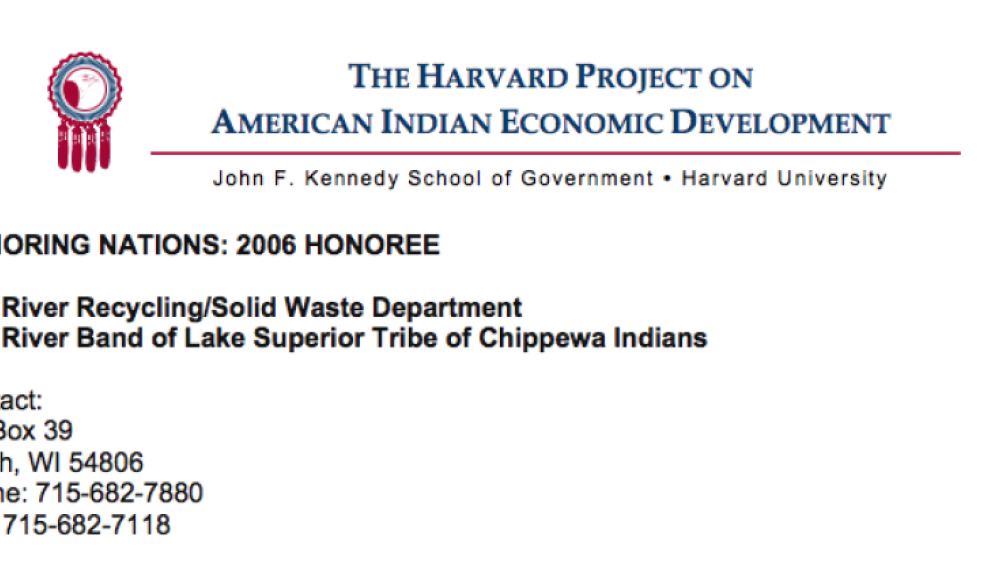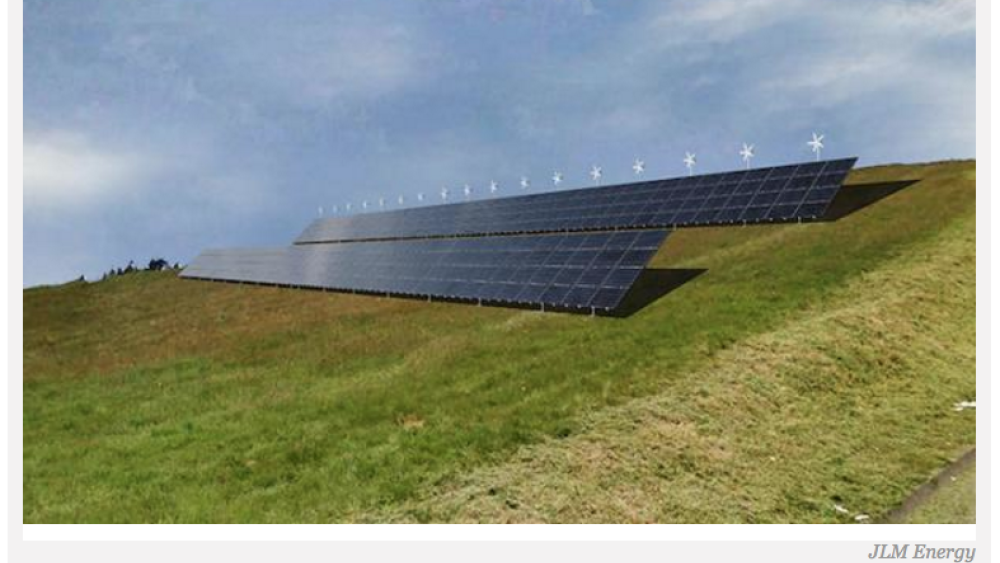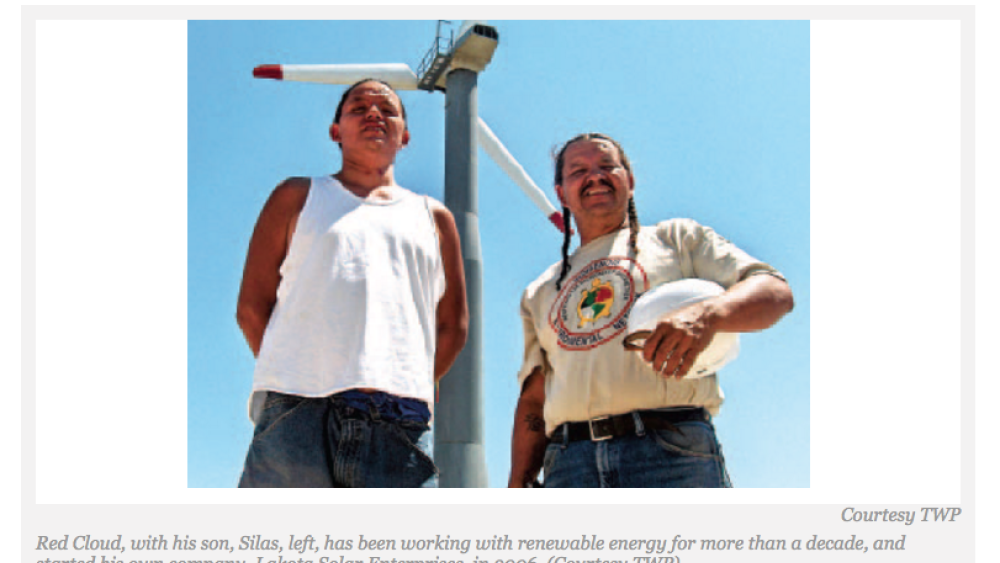Former Manager Don Corbine of the Bad River Recycling/Sold Waste Department shares how the Bad River Band of Lake Superior Chippewa Tribe is using recycling to clean up their community and reinvigorate community pride among its citizens.
Additional Information
Corbine, Don. "The Bad River Chippewa Recycling/Solid Waste Department." Honoring Nations symposium. Harvard Project on American Indian Economic Development, John F. Kennedy School of Government, Harvard University. Cambridge, Massachusetts. September 27-28, 2007. Presentation.
Transcript
Michael Lipsky:
"Our next speaker is Don Corbine from Bad River Recycling."
Don Corbine:
"Boozhoo. I'm Don Corbine. I'm a member of the Bad River Band of Lake Superior Chippewa. My Indian name is [Anishinaabe language]; I am called Red Cloud Clear Sky. I'm a sky person; I look over things. It has always been a part of my life that I've always been in the sky in my dreams, in my physical life. Part of my life early on was the military; I was an 82nd Airborne paratrooper. Later on in life, I became an ironworker on a bolt up gang. So I was always up there in the sky, I was always looking down at earth. And from up there, from that point of view, I could see many things happening. One day, eventually, I moved back home and maybe for the purpose of what I'm doing now. I'd like to thank the programs for all your wonderful stories, for your encouragement. I'd like to thank the board members for your strong words and it makes me feel good in my heart. I'd like to thank the Honoring Nations staff, Amy [Besaw Medford], for all your wonderful help and everybody just participating here.
My official title with the tribe is Operations Manager for the Recycling/Solid Waste Department. In laymen's terms, I'm a 'garbologist.' I've worked for the tribe for about 12 years and the tribe has been recycling and they've been in this endeavor since 1989. Well, almost 30 years and since that 30 years, probably half of that time, it was a little stagnant and the program wasn't really going anywhere. And they separated the duties from our water and sewer department and they developed this position. And it was something of interest to me and I felt that I could help the tribe and the program. Al [Pemberton], if you ever get another plane you bring it down to Bad River, I'll scrap it out for you. So my business here today is 'talking trash.'
But first I want to give you a brief bio on what this department is all about, what type of services we offer, and how we approach our constituents. Our function is the collection, the processing, the handling and the marketing. We've been recycling for quite a long time. Currently we're recycling about 18 recyclable items. We're doing number ones, number twos, aluminum, cardboard, magazines, glass, tin, mixed cardboard, newspaper, shredded paper, office paper, appliances, electronics, metals, tires, yard waste, household hazardous waste, and there's a lot of those items also. So we look at the proper disposal and handling of all these items. We see that they're managed in their proper perspective and we're seeing that there is no negative impact to our lands, or our waters, or anything else.
We provide service to both tribal and non-tribal. We provide a service to households, as well as businesses. We work with everybody closely. There's always communication there. There's always an open line. I'm only a phone call away. I'm here to provide solutions. If you have something, and we all have -- before I came into this position I had never realized the amount of waste that we generate. It's amazing. Our program's objectives are to provide a high-quality service, a personalized service, a program that promotes a healthy environment, and adopting environmentally sound practices. We provide public education, which is mutual to both the community and the program. We maintain a high level of community competence. We have to gain their support. Community cooperation and participation is essential. It's necessary and community members need to buy into this. And without their involvement this program wouldn't be a success.
Some of our methods include, well, the education aspect of it -- we promote proper disposal methods, we promote program requirements, we promote ordinances, we promote the benefits of compliance; we talk about cost effectiveness, material reuse, marketing; we are environmentally friendly. And by doing so we hope that some of these activities we're involved in, while they save energy, they save a lot of different processes, they're helpful to the overall operation. Our operation is cultural. As Natives, we respect our surroundings. And I'm from an area in northern Wisconsin, on the shores of Lake Superior, where it's so beautiful and clean and pristine that these type of things would harm it if it was rampant, or if it ran wild, and illegal dumping took place, and what not. And things of that nature did happen before. And over the years we've been working at cleaning up all these sorts of things -- we're caretakers, we're stewards, we're responsible for our Mother, our provider, and we're obligated to watch over her.
Some of the other educational tools that we use are by the means of newspapers, tribal newspapers. We could stick in there most anything and what we stick in there are articles of encouragement. We give praise to our communities and their contributions that they make. We keep our public informed on current trends, regulatory updates, and departmental achievements. Some of the other things are the circulation of brochures, flyers, public notices, just reminders; just keeping everybody informed and just keeping a visual for everybody to see that these things are always there and we're here to help you. We had to develop community trust and we have to respect each individual household and person individually. We have to be respectful of their needs, their concerns and no problem is too small. If it concerns them, then it concerns us. Their concerns are our concerns. If we need to go door to door and explain, and teach, and assist them with understanding, well, that's what we're going to do.
Other things we do in our community to promote community involvement is support in the community and tribal events, working collectively with other tribal departments to accomplish or meet their goals. And sometimes our goals overlap or match. For instance, we work with the air quality people. We developed a burn barrel exchange and then took it a step further and went to a burn barrel buy back. We found that some households were still kind of like in that rut of taking their garbage out back, throw it in the barrel, and lighting that baby up. So in our roaming around the res, and going to everybody's houses, a lot of people felt interested in this idea. And because of that, today we've reduced toxic emissions by 27 percent.
We collaborate efforts with our EPA [Environmental Protection Agency] specialists. We collaborate and assist every household and tribal entity within our structure. We're there for their needs, to support them. We employ summer youth in summer intern positions and they get hands-on experience of what we do and how we provide. We employ additional people, during a certain time of year, for our spring clean up. On that little adventure it takes at least a month. We're in the community for two straight weeks going curbside, door-to-door, promoting; we're looking for waste. We don't want to miss anything that, any kind of step that's going to, we're going to find that waste in a ditch line, or one of our ravines, or streams, or on our beaches, or anywhere else. So we look at every effort that we can possibly imagine, from every angle, to provide for them. We work with the powwow committees, the housing authority and, like I said, tribal infrastructure.
Encouraging community involvement and participation comes in many forms. First you have to show you care. You put into it what you get out of it. And like the old saying goes, when you put out good, it'll come back. Your rewards are noticeable and their reward is their participation and buying into the program and supporting it. Nothing's too small. And at the time your community members notice these things, your communities are cleaner, your beaches are cleaner, your roadways are cleaner, everything; it's just a noticeable thing. And it's not only because of what we do, but it's what they've put into the program and their support of our endeavors.
Some of the other things that we do -- But first there's this old-age concept, a value of sorts, that's called giving back. It helps reinforce the concept of caring and sharing with the community. Through the years we came to times where, for instance, the Social Service Department ran a food shelf and it was during Thanksgiving, right before Thanksgiving. And during a department head meeting, I was in discussion with [the] social service director, and she made it known at the meeting that her food shelf went dry. So I'm thinking like, how the hell could that happen? There's always got to be a contributor somewhere that cares about this. So I took it upon myself to find a solution. Oh, and I've got a bunch of marketable materials in my building too. So I went and cashed in a couple bales and I gave those proceeds to that food shelf. Well, they made everybody happy during Thanksgiving for those that were in need. And then once again, a youth program, they were in need of sports equipment; basketballs, baseballs, bats, whatever. And they approached me and they said, "˜We're having a hard time here. We only need a little bit but whatever you can do would help.' So again I dig in that garage and I pull out a couple more bales; take them to market, give them the money. I say, "˜Here, buy your sports equipment.' Other times when a resident becomes ill and they're trying to raise money for beneficial purposes to offset hospital costs or what not, we again, dig in that little shed, pull out a little bit and help them with start up money so they can have their benefit.
We've developed close and personal relationships with our vendors and service providers, family-run businesses. And if they experience a loss, we care about them. We've been doing business with a lot of these people for a long time. And out of respect we'll send flowers, cards, condolences. And these are the things that people remember. These are activities, which our community connected.
Some of the confirmations that shows that we're going the right way, and the first one -- and I move about quite a bit and I never really hear firsthand what community members feel about the program besides, 'Hey, that darn truck is late. Where the hell you at?' So during our visit from Amy, Catherine [Curtis], we had a reception and after we had a community panel. And a community panel was set up of members from different communities throughout the reservation. I introduced everybody and asked them if they wanted me to sit down and partake in this little discussion. And I felt I was maybe going to be in an area where I don't want to be. I didn't want to listen to any negativity or get yelled at or whatever. So they asked me to sit down with them anyway. And what I heard at that table was amazing. I had one grandma describing how long she'd been recycling and teaching her children to recycle. And after a few years, her daughter had a child and now she's teaching that child how to recycle. So three generations of recyclers right there in one house. That's awesome to me. As I sat there and listened to the rest of the panel, they had a lot of good things to say too. And I was just kind of blown away. I'm like, 'Holy crap, all this work did pay off.' But then there's some other noticeable things that we see, and it's the physical beauty of the community. And there are some not so good things because people rely on us so much. They call us every day. They call us about litterers, about places where people are starting to drop stuff off at. And one thing that is gratifying around the holiday is my staff gets cards, they get money, and they're shown their appreciation by the constituents, and it's a feel-good situation. And one thing that I look at as being a reward is that our recycling rate has increased. During the past year, we've been working on an integrated solid waste management plan. And through the collection of all that data, and going through it, and just finding out where the heck we're at, we found out we're recycling 46 percent of our waste, of our total waste. Now the tribe has greater expectations of us. They're used to having things done on schedule, and like the mailman, whether they're hot or not, rain or snow, or 30 below. They count on us.
Since we've received our recognition award from Honoring Nations, we've had reason to celebrate. We've been given praise from state, tribal, and government officials. The tribe had a big luncheon for us when we got back. The community was there to help celebrate. The state senator stopped by and [???] stopped by, gave us a recognition award. The BIA [Bureau of Indian Affairs] Great Lakes Agency gave us an accomplishment award. The Wisconsin DNR [Department of Natural Resources] sent a letter congratulating us on our achievements. And all the news -- a lot of newspaper articles, a lot of sharing this information and spotlighting this program. From that, we've been called in by another Chippewa Band, the Lac Courte Oreilles Band, to come down and take a look at their program, to make recommendations to see what we can do to help. One last thing I want to share about our program. It's not a big, expensive program; it's not state-of-the-art. It's about doing what you have to do with what's available, making the most of what you have, and doing big things with very little. So there is a revolution at hand, and we're in for the ride."



